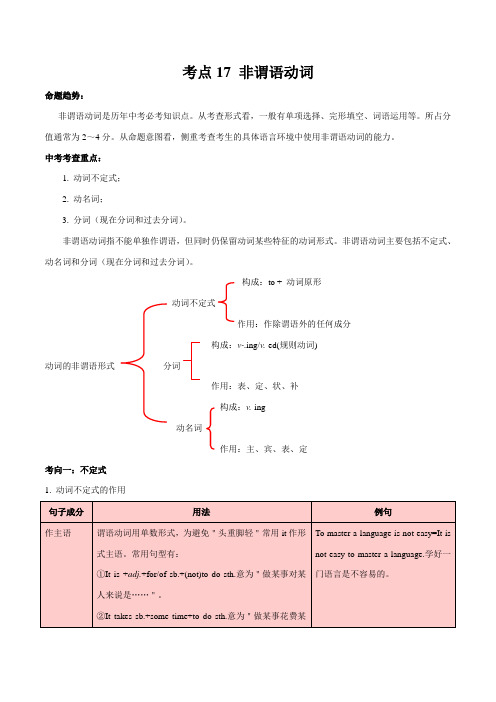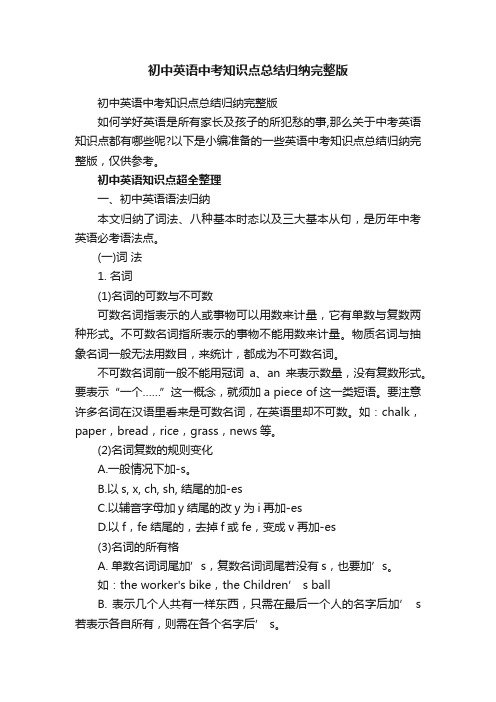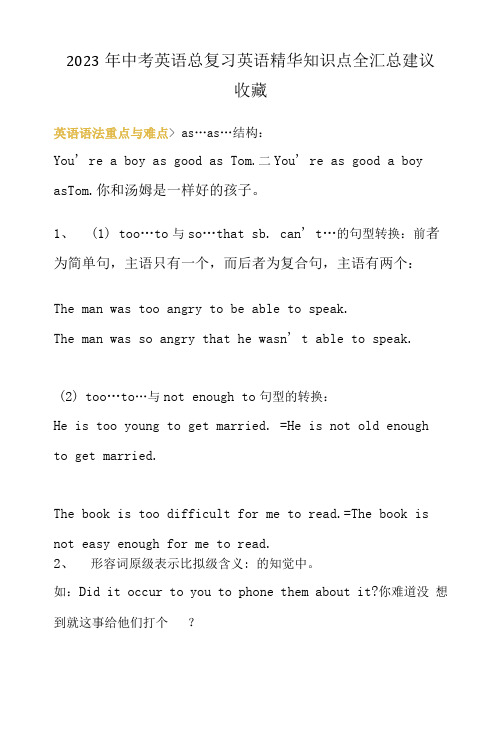中考英语知识点讲解 (17)
广州中考英语知识点

广州中考英语知识点广州中考英语知识点_中考知识要点英语是中考重点的考查科目之一,那么你知道广州中考英语都有哪些知识点吗接下来学习啦小编为你整理了广州中考英语知识点,一起来看看吧。
广州中考英语知识点:代词代词是代替名词、形容词和数词的词。
按其意义、特征及其在句中的作用分为:人称代词、物主代词、指示代词、反身代词、相互代词、疑问代词、不定代词和关系代词等。
一. 人称代词1.人称代词的人称、数和格,如下表所示。
2.人称代词有主格和宾格之分。
通常主格作主语,宾格作宾语。
如:I like tabletennis. (作主语)Do you know him(作宾语)3.人称代词还可作表语。
作表语时用宾格。
如:---Whos isknocking at the door---It’s me.4.人称代词在than之后与其他人或事物进行比较时,用主格和宾格都可以。
如:He is olderthan me.He is older than I am.二. 物主代词1.表示所有关系的代词叫物主代词。
物主代词分形容词性物主代词和名词性物主代词,如下表所示。
2. 形容词性物主代词的作用相当于形容词,可在句中作定语。
例如:Our teacheris coming to see us.Thisis her pencil-box.3. 名词性物主代词的作用相当于名词,在句中可用作主语、宾语和表语。
Our school ishere, and theirs is there.(作主语)--- Is thisEnglish-book yours (作表语)--- No. Mine is inmy bag.I ve alreadyfinished my homework. Have you finished yours (作宾语)三. 指示代词指示代词包括:this,that,these,those。
1. this和these一般用来指在时间或空间上较近的事物或人,that和those则指时间和空间上较远的事物或人,例如:This isa pen and that is a pencil.We are busy these days.In those daysthe workers had a hard time.2. 有时that和those指前面讲到过的事物,this 和these则是指下面将要讲到的事物,例如:I had a cold. That swhy I didn t come.What I want to sayis this ; pronunciation is very important in learning English.3. 有时为了避免重复提到的名词,常可用that或those代替,例如:Television sets made in Beijing are just as good as those madein Shanghai.4. this 在电话用语中代表自己,that 则代表对方。
初中英语中考复习 考点17 非谓语动词-备战2021年中考英语考点一遍过 (解析版)

4.Mr, Green was so angry that he couldn’t help________(shout) at his wife.
5.We should avoid________(disturb) others.
②动词不定式的否定形式是not to do,其被动形式为to be done。
►Our teacher asked us not to swim in the river alone.我们老师要求我们不要独自一人在河里游泳。
③常接"疑问词+带to的不定式"的动词有teach,show,tell,learn,find out,decide,know,forget等。
13.He promised________(follow) the good suggestions.
14.If you have a chance________(study) here,you will learn more knowledge.
15.Learn the new while________(review) the old.
6r himself.
7.We must take strong measure________(protect)our environment.
8.I happened________(meet) one of my friends in the street yesterday.
考向三:分词
(一)现在分词和过去分词的构成
现在分词由v.+ing构成,过去分词v.+ed(规则动词)构成。
河北冀教版中考英语 17_第17课时 九年级(全) Unit 9~Unit 10

(3)hard作副词,意为“努力地,用力地”。 She has worked hard all her life.她一生辛勤工作。 (4)hardly 是副词,意为“几乎不;几乎没有”,同义短语为almost not。 I can hardly keep my eyes open.我困得都快睁不开眼了。 注意 hardly 具有否定意义,用在反意疑问句的陈述部分中时,反意疑问部分 用肯定形式。 The girl can hardly walk, can she?这个女孩几乎不能走路,是吗?
要点精讲
知识点1 hardly的用法
释义 意为“几乎不;几乎没有” 辨析hard 与hardly (1)hard作形容词,意为“困难的”,同义词是difficult。 It’s very hard to learn math well. 把数学学好是很困难的。 (2)hard作形容词,还可指“坚硬的”,反义词是soft。 The bread is too hard to eat.面包硬得不能吃了。
单项选择
①My daughter studies B . She
goes to sleep before 11 o’clock at night.
A.hard;hard
B.hard;hardly
C.hardly;hardly D.hardly;hard
②—These problems are too D to work out.Will you give me some advice?
单项选择
①The students all promise B harder in the new term.
A.work
B.to work C.working D.worked
中考新版八年级英语下册第1至第10单元知识点总结+单元知识点归纳

中考新版八年级英语下册第1至第10单元知识点总结+单元知识点归纳中考新版八年级英语下册第1至第10单元知识点总结Unit 1 What’s the matter?一、基础知识1. What’ s the matter with you?= What’s the trouble with you?= What’ s wrong with you? 你怎么了?【注】:matter 和trouble 为名词,其前可加the 或形容词性物主代词,wrong 是adj. 不能加the2. have a cold=catch a cold=have the flu 感冒have a fever发烧have a cough 咳嗽have a stomachache胃疼,肚子疼have a toothache牙疼have a headache头疼3. 身体部位+ache(疼痛)构成新的复合词stomach+ache=stomachachehead+ache=headachetooth+ache=toothacheback+ache=backache后背痛4. much too+形容词,意为太...... ,too much+名词,意为很多,大量。
5. lie down躺下,lie lay lain lying 躺lay laid laid laying放/ 下蛋lie lied lied lying 说谎6. maybe“或许”may be,是情态动词+be的结构,意为“可能,也许”7. get off (the bus)下(公交车)get on上车get into 进入get to到达get through穿过;完成8.agree with sth.同意某事agree to sb. 同意某人的意见9. be in trouble 遇到麻烦make trouble制造麻烦have trouble (in) doing sth.=have difficulties (in) doing sth做......有麻烦。
中考英语语法复习过去进行时知识点(共17张PPT)

3.My brother ___ while he ___ his bicycle and hurt himself. A.fell,was riding B.fell,were riding C.had fallen,rode D.had fallen,was riding 4.Tom ___ into the house when no one ___. A.slipped,was looking B.had slipped,looked C.slipped,had looked D.was slipping,looked
典型例题:I ______ (write) a letter at ten last night. 解析:所给的时间状语at ten last nigh“昨天晚上十点钟”是具体的过去 的某一时刻,所以应该用过去进行时。 答案:was writing
典型例题1:Mary a dress when she cut her finger. A. made B. is making C. was making D. makes 解析:割伤手指是已发生的事情,应用 过去时。同时,when表时间的同时性 ,表示“割伤手指”的时候“玛丽做衣 服”的动作正在进行,它提供事情发生 的背景,因此用过去进行时。 答案C.
9.The reporter said that the UFO ___ east to west when he saw it. A.was traveling B.traveled C.had been traveling D.was to travel 10.I ___ my breakfast when the morning post came. A.had B.had been having C.have been having D.was having
初中英语中考知识点总结归纳完整版

初中英语中考知识点总结归纳完整版初中英语中考知识点总结归纳完整版如何学好英语是所有家长及孩子的所犯愁的事,那么关于中考英语知识点都有哪些呢?以下是小编准备的一些英语中考知识点总结归纳完整版,仅供参考。
初中英语知识点超全整理一、初中英语语法归纳本文归纳了词法、八种基本时态以及三大基本从句,是历年中考英语必考语法点。
(一)词法1. 名词(1)名词的可数与不可数可数名词指表示的人或事物可以用数来计量,它有单数与复数两种形式。
不可数名词指所表示的事物不能用数来计量。
物质名词与抽象名词一般无法用数目,来统计,都成为不可数名词。
不可数名词前一般不能用冠词a、an来表示数量,没有复数形式。
要表示“一个……”这一概念,就须加a piece of这一类短语。
要注意许多名词在汉语里看来是可数名词,在英语里却不可数。
如:chalk,paper,bread,rice,grass,news等。
(2)名词复数的规则变化A.一般情况下加-s。
B.以s, x, ch, sh, 结尾的加-esC.以辅音字母加y结尾的改y为i再加-esD.以f,fe结尾的,去掉f或fe,变成v再加-es(3)名词的所有格A. 单数名词词尾加’s,复数名词词尾若没有s,也要加’s。
如:the worker's bike,the Children’ s ballB. 表示几个人共有一样东西,只需在最后一个人的名字后加’ s 若表示各自所有,则需在各个名字后’ s。
如:This is Lucy and Licy’ s room.These are Kate's and jack’ s rooms.C. 如果是通过在词尾加—s构成的复数形式的名词,只加’。
如:the students’ books,the girls’ blouses(另外:名词+of+名词名词是有生命的,我们就用’s结构来表示所有关系。
如果名词所表示的事物是无生命的,我们就要用名词+of+名词的结构来表示所有关系。
2023年中考英语总复习英语精华知识点全汇总建议收藏

2023年中考英语总复习英语精华知识点全汇总建议收藏英语语法重点与难点> as…as…结构:You' re a boy as good as Tom.二You' re as good a boy asTom.你和汤姆是一样好的孩子。
1、(1) too…to与so…that sb. can' t…的句型转换:前者为简单句,主语只有一个,而后者为复合句,主语有两个:The man was too angry to be able to speak.The man was so angry that he wasn' t able to speak.(2)too…to…与not enough to句型的转换:He is too young to get married. =He is not old enough to get married.The book is too difficult for me to read.=The book isnot easy enough for me to read.2、形容词原级表示比拟级含义: 的知觉中。
如:Did it occur to you to phone them about it?你难道没想到就这事给他们打个?事件作主语时,happen和occur可以通用?如:The accident happened/occurred yesterday. 事故是昨天发生的。
take place指事件发生,但常用来表示“举行”的意思,带有非偶然性?如:The meeting took place last night.会议昨晚举行。
14.in front of, in the front of in front of的意思是“在前面”。
如:There is a tree in front of the house.房子前面有一棵树。
2024年九年级中考英语一轮复习中考必考单词知识点讲解(751780词讲义)

2024届九年级中考英语一轮复习【词汇短语专题】中考必考单词知识点讲解(751780词讲义)九年级英语教研室整理每日单词积累,祝同学们中考顺利!751、meal名词,早(或午、晚)餐;一餐所吃的食物cook a meal做饭have a meal吃饭between meals两餐之间752、mean动词,意思是;打算meantmeant(过去式和过去分词)meaning(名词,意义;意思)meaningful(形容词,有意义的)meaningless(形容词,毫无意义的)mean to do sth打算去做某事mean doing sth意味着做某事mean sth to sb某事对某人来说意义重大What does it mean?=What's the meaning of it?它是什么意思?What's the true meaning or spirit of the Spring Festival?春节的真正意义和精神是什么?I think the true meaning of our life is to challenge and improve ourselves. 我认为生活的真正意义就是挑战和自我提高。
❤️mean形容词,吝啬的;自私的She has been mean with money.她在花钱方面总是非常吝啬。
753、meat名词,肉too much meat太多的肉meat dumplings=dumplings with meat肉饺子754、medicine名词,药;医学take (some )medicine吃药traditional Chinese medicine传统中医study medicine学习医学❤️medical形容词,医疗的;医学的medical workers医务工作者medical rubbish医疗垃圾medical examination体检medical care医疗护理755、meet动词,遇见;相逢;满足metmet(过去式和过去分词)meeting(现在分词/动名词)meeting,名词,会议;集会;会面Nice to meet you.很高兴见到你。
- 1、下载文档前请自行甄别文档内容的完整性,平台不提供额外的编辑、内容补充、找答案等附加服务。
- 2、"仅部分预览"的文档,不可在线预览部分如存在完整性等问题,可反馈申请退款(可完整预览的文档不适用该条件!)。
- 3、如文档侵犯您的权益,请联系客服反馈,我们会尽快为您处理(人工客服工作时间:9:00-18:30)。
考点 4
1. hurt作为及物动词,意为“损害; 使受伤; 使伤心; 使受皮肉 之苦”;作为不及物动词,意为 “疼痛;感到疼痛; 有害”; 作为名词,意为 “伤害; 痛苦”,是不可数名词,可指对身 体上的伤害,也指对心灵造成的伤害。其第三人称单数是 hurts ,现在分词是hurting, 过去式是hurt ,过去分词是hurt 。
(绥化中考)
Nowadays, most people prefer to ___ computer games rather than___ books.
A. play; reading B. play; read
C. playing; reading
解析:考查非谓语动词。句意:当今大部分人喜欢电脑游戏胜过读 书。根据题干中的prefer to和rather than可知,该题考查固定用法: prefer to do sth. rather than do sth.“喜欢……胜过……”。 答案: B
易混辨析
1. worth作形容词时只能作表ห้องสมุดไป่ตู้,后接名词或动名词的主动形式。 2. worthy可作表语,也可作定语。作定语时意为“有价值的;值得尊敬的;应受
到赏识的”;作表语时意为“值得……的;应得到……的”,其后接of sth., 也可以接to do sth.。如: The film is worthy to be seen again. 这部电影值得再看一遍。 That is very worthy of our attention. 那件事很值得我们注意。 This is a worthy article. 这是一篇值得一看的文章。 3. “worthy of+动名词”与“worth+动名词”在形式上完全不同:worthy of后面 接被动式的动名词;而worth后面接主动式的动名词,虽然在形式上是主动的, 但在意义上仍然是被动的。如:
2. prefer doing sth. “更喜欢做某事”,表示一般情况;prefer to do sth. “更 喜欢做某事” 表示特定动作。如:
I prefer walking alone. 我喜欢一个人溜达. —Can I give you a lift? 你顺便坐我的车走吗? —No, thanks. I prefer to walk. 不用了,谢谢。我想散会儿步。 3 . prefer与would或should连用时, 表示特定的想法,后接不定式。如: We would prefer to do it later. 我们宁愿以后做它. 【注意】当would prefer后面省略时,要注意保留其中的to。如: —Would you prefer to wait in the station?你愿意在车站等吗? —Yes, I’d prefer to. 是的,我愿意等。
6. suppose+名词 /代词+介词短语。如: I supposed him in the office. 我想他在办公室里。
7. I suppose作插入语。如: You don’t mind my smoking, I suppose. 我想你不会介意我抽烟。
易混辨析 be supposed to do sth. “应该做某事”, 相当于should或be expected to do sth.
Did you close all the doors and windows? 你把所有的门窗都关了吗? Close your eyes. 把眼睛闭上。 Do you mind if I close this window? 我把这窗户关起来好吗?
2. shut的意思是“关;关闭”,常常可与close通用,但它相比close意 思较强。比如说to close a door or gate时,仅指把门关上;而说to shut a door or gate时,则可进而指用门闩、插销或其他东西把门关住。此外, shut 还往往不如close正式。如: They shut the doors and windows. 他们关闭了门窗。 Shut the box. 把箱子关起来。 Shut the door after you. 随手关门。
Several policemen were injured in the clashes. 几名警察在冲突中受伤。
The music makes people recall their deepest _w_o_u_n_d_s_ from their own sad or painful experiences.
in America.
A. shaking
B. to shake
C. shake
解析:考查非谓语动词。句意:在美国,当人们第一次见面时应该握 手。根据are supposed 和选项可知,该题考查be supposed to do sth. “应该做某事”。 答案: B
考点 3
1. close用作动词表示“关;闭”的意思时,通常仅指把开着的东西关 闭起来。如:
The wound is healing nicely. 伤口愈合得很好。
3. injure是动词,意为“损害,毁坏; 伤害(名誉、自尊等); (尤指事故中) 伤害; 伤害(感情,自尊心等)”。其第三 人称单数: injures, 现在分词:injuring, 过去式:injured, 过去分词:injured。
解析:句意:音乐让人们回忆起他们经历中最深的伤痛。根据题干 中的 sad or painful experiences“伤痛经历”可推测,会造成一些伤害。 wound“伤口; 创伤; 伤害”,是可数名词,其复数形式是wounds。 答案: wounds
考点 5
worth可作形容词,意为“值得的; 有……的价值”。 主要用法是:be worth +名词/ 动名词。如: 1. be worth+名词 “……值……” The car is worth 2 million yuan. 这辆车值两百万元。 2. be worth doing sth. “作某事是值得的” The question is not worth discussing again and again. 这个问题不值得一遍又一遍地讨论。
3. suppose+名词/代词+不定式。如: I supposed her to have already left for home. 我以为她已经回家了。
4. suppose+名词/代词+名词。如: I never supposed him a hero. 我从来没有认为他是一个英雄。
5. suppose+名词/代词+形容词 。如: We all suppose him clever. 我们所有的人都认为他聪明。
His collar bone only hurt when he lifted his arm. 他只有在抬臂时才感觉到锁骨会痛。
2. wound作为名词,意为 “伤口;创伤;伤害”,一般指外 伤,尤其指在战争中、打斗中受伤;作动词,意为“伤害”。 其第三人称单数:wounds , 复数形式:wounds, 现在分词: wounding, 过去式:wounded, 过去分词:wounded。
3. shut in 锁/封在里边;关 The village is shut in big mountains. 这村子四周环山。
4. shut off 停止;关掉;隔绝;使不进入 They pulled over and shut off the engine. 她们靠边停车熄火。 The current has been shut off.电流被切断了。 We are really shut off here. 我们这里确实是闭塞。
I don’t suppose I’ll trouble you. 我想我不会麻烦你。 I don’t suppose (that) I shall be back until eight o’clock. 我看我在8点前回不来。
(绥化中考)
People are supposed ________ hands when they meet for the first time
5. shut out 排除;把……关在外边 The highest mountains can’t shut out the sunshine. 高山挡不住太阳。
6. shut up 安静;闭嘴;关严;闭口不言 Just shut up, will you?闭嘴,好吗?
(东营中考)
—The government is trying to protect the environment now.
初中英语
九年级全一册 第17讲 Units 9-11
1
考点 1:prefer的用法 考点 2:suppose的用法 考点 3:close与shut 考点 4:hurt,wound与injure 考点 5:worth的用法 考点 6:except, besides, but与except for
考点 1
shut短语
1. shut away关起来 I hate being shut away in the countryside. 我很不喜欢住在闭塞的乡村。
2. shut down关闭;停工;停止运转;停机 The shop has shut down because of lack of trade. 那家商店因生意萧条而停业。
考点 2
suppose作及物动词,意为“想;认为;猜想;料想”。主要用法如下:
1. suppose +that +从句,that可以省略。如: I suppose we’ll go there next week. 我猜想我们下周将去那儿。
2. suppose +名词/代词+ (to be)+形容词 +其他。如: What makes you suppose him to be connected with them? 你怎么会认为他与他们有联系呢?
